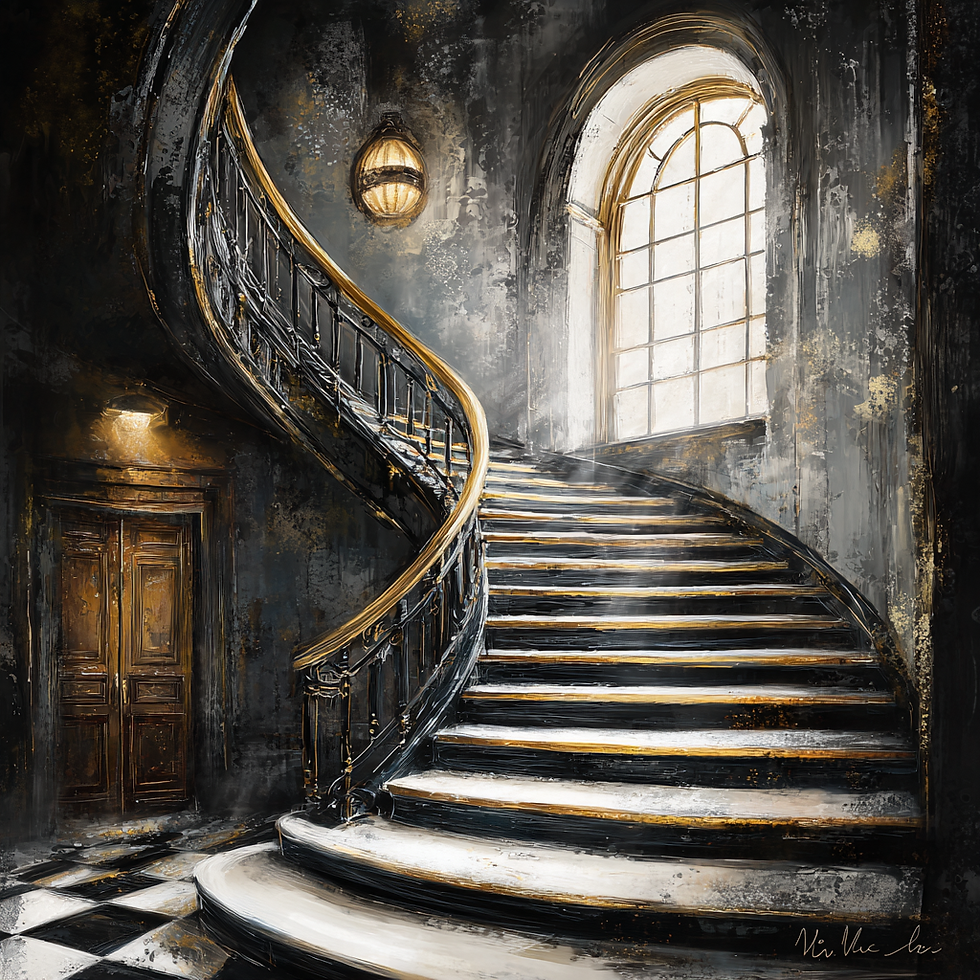Matilde: Life, Children, and Time
- carmen fernandez de cordoba
- Aug 2, 2025
- 3 min read

Childhood and Roots
Matilde G. was born in the early 1930s in the historic heart of Valencia. She grew up in a house full of history, with a white marble entrance, a courtyard well, and an imperial staircase she still remembers with emotion. Her childhood unfolded between material scarcity and deep affection. “We had nothing, but whatever little came our way was shared. What mattered was being together,” she would say. Chocolate was really carob, and hand-me-down shoes were treasures. Afternoons carried the scent of neighbors’ soap as they washed in the courtyards. Dresses came from her cousin Consuelo, and clothes were not a source of shame but of family continuity.
Mother as Emotional Anchor.
The great pillar of her life was her mother—a woman without formal education who could recite Campoamor and Gabriel y Galán by heart. “My mother taught me to smile. She always smiled. She never lost her joy, not even with a son who had cerebral palsy.” Matilde recalls how, from a young age, her mother asked her to care for her sick brother. She did it with love, without drama, and without expecting recognition. For her, her mother was her first and deepest school of emotions and values.
Love in Times of Scarcity.
Matilde fell in love with Fernando at a university gathering. The next day, he was already waiting outside her class with a book in hand. They were never apart after that and built a family with five children. “Love back then wasn’t fast or calculated. It was giving. It was trusting that if you loved each other, the rest would work itself out.” She contrasts it with what she sees in her granddaughters: many live with their partners but don’t marry. “Everything is so rationalized now that the most important thing—the madness of love—is lost.” Yet she says it with tenderness, not judgment. She values freedom but misses depth.
Family as Emotional Legacy.
“My children are the best thing I have done in my life. That I know for sure.” At 94, Matilde lives alone but feels accompanied in spirit by them. They all live far away—in different parts of Europe and Spain—but call her every night. “Sometimes I do feel lonely, of course. But I’m at peace. I’ve accepted it. I understand.” She doesn’t speak with resentment, though there’s a soft nostalgia when she recalls how elders used to live with their children. “Now we have Sunday lunch together. But we’re no longer the center. We’re visitors.”
Values From Another Time.
Matilde speaks clearly about what has been lost: respect, manners, trust. “Back then, a word was a contract. Now everything is signed and still gets broken.” She believes children today have too much and value too little. “We inherited clothes, shared everything, and knew when something was truly a gift. Today they demand, but don’t appreciate.” Regarding parenting, she adds: “Parents give too much without asking for anything in return. And children aren’t happier, just more demanding.”
Loneliness and Wisdom.
Becoming a widow changed her world. “A completely different stage. There’s no more ‘us.’ There’s ‘me.’” She finds refuge in her memories, the flowers she lovingly cares for, and her granddaughters—especially the women—with whom she shares a deeper emotional bond. “Men are more practical. Women go more to the soul.” Matilde now treasures her friendships with women: “You can talk about everything, without fear, without masks. That’s gold.”
Spirituality and the Meaning of Time.
She studied Philosophy and Humanities, as well as Teaching. “Back then, it was called Humanities. And that’s what it was about: understanding the human being.” Religion played an important role in her life, though she says she was never fanatical. “There was a sacred respect for certain things. Today people brag about not believing in anything, and sometimes that leaves them empty.” For her, a good life means having loved, been useful, and raised a family. “I haven’t done anything extraordinary, but my children are extraordinary. That is my reward.”
Looking Ahead.
Matilde doesn’t reject the present but warns about what we shouldn’t lose: “Love, family, friendship. That’s worth more than anything else. And it’s what’s least taught today.” If she could leave a message for those yet to be born, she would say: “Not money, not power, not technology. The most important thing is to have someone who truly loves you. Someone you can call when you’re not okay. That’s what brings peace.”
(NONAGENARIAN SERIES)



Comments